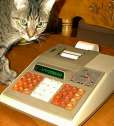NEC PC-2001
| Datasheet legend
Ab/c:
Fractions calculation
AC: Alternating current BaseN: Number base calculations Card: Magnetic card storage Cmem: Continuous memory Cond: Conditional execution Const: Scientific constants Cplx: Complex number arithmetic DC: Direct current Eqlib: Equation library Exp: Exponential/log functions Fin: Financial functions Grph: Graphing capability Hyp: Hyperbolic functions Ind: Indirect addressing Intg: Numerical integration Jump: Unconditional jump (GOTO) Lbl: Program labels LCD: Liquid Crystal Display LED: Light-Emitting Diode Li-ion: Li-ion rechargeable battery Lreg: Linear regression (2-var. stats) mA: Milliamperes of current Mtrx: Matrix support NiCd: Nickel-Cadmium recharg. batt. NiMH: Nickel-metal-hydrite rech. batt. Prnt: Printer RTC: Real-time clock Sdev: Standard deviation (1-var. stats) Solv: Equation solver Subr: Subroutine call capability Symb: Symbolic computing Tape: Magnetic tape storage Trig: Trigonometric functions Units: Unit conversions VAC: Volts AC VDC: Volts DC |
| ||||||||||||||||||||||||||||||||||||||||||||||||||||||||
NEC PC-2001
 A most curious machine! Its size alone is more reminiscent of Russian handheld computers, such as the MK-90. Nevertheless, the NEC PC-2001 is not Russian: judging by its appearance and rarity, it is a Japanese-only model, and the only one that I know of to date made by NEC, a company better known as a chip manufacturer.
A most curious machine! Its size alone is more reminiscent of Russian handheld computers, such as the MK-90. Nevertheless, the NEC PC-2001 is not Russian: judging by its appearance and rarity, it is a Japanese-only model, and the only one that I know of to date made by NEC, a company better known as a chip manufacturer.
The PC-2001 appears to be a de luxe variant of the handheld computer theme. It has several dedicated I/O ports: serial I/O, a printer port, a cassette port. It also has a bus expansion slot. It can be operated from AC or from a set of AA batteries. It has a large, almost usable keyboard, and a 2×40 line large alphanumeric display. Oh, and did I mention that it can also beep?
What a shame that its BASIC is a severely limited version. It only supports single-precision floating point numbers. As near as I can determine without documentation, it also has a very limited implementation of common utility and scientific functions.
The following programming example computes the natural logarithm of the Gamma function within the limited precision available on this device:
10 INPUTX 20 G=1 30 IFX>5THEN70 40 G=G*X 50 X=X+1 60 GOTO30 70 PRINTX*LOG(X)-X+LOG(6.28319/X)/2+((1/99/X/X-1/30)/X/X+1)/12-LOG(G)

